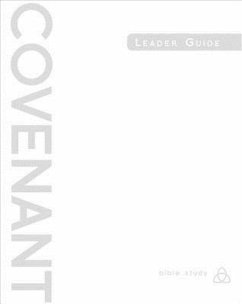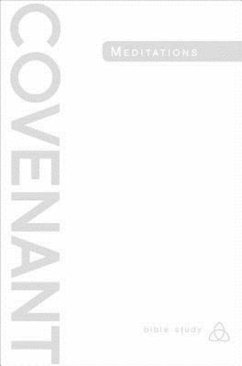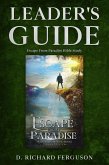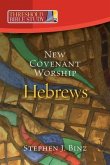This Covenant experience will guide participants in a comprehensive, in-depth study of the Bible over twenty-four weeks. Unlike the learning participants may have experienced in other groups, this in-depth study of the whole Bible emphasizes the biblical concept of covenant as a unifying pattern through all the books in the Old and New Testaments. It underscores the unique relationship that God chooses to have with us as God's people. This relationship is grounded in the faithfulness of God's love and on our ongoing commitment to stay in love with God while we share signs of that love with others.
Each episode connects to an aspect of this covenant relationship, which is summarized in the heading of each participant guide.
COVENANT TRANSLATES INTO ACTIONS-into how we behave in our everyday lives. That's why the second module, Living the Covenant, focuses on how the community lives out their covenant in faithful love-how it's applied to actual relationships in daily life.
The books included in these eight episodes examine the practical challenges of faithful covenant life. We explore leadership problems among tribal chieftains, kings and prophets, and spiritual and political crises. They look for practical wisdom and guidance in the teachings of Israel's sages, the letters of Paul, and more.
And by demonstrating how people of vastly different cultures came together in a common purpose, they show how faithful love is the root of the covenant life.
Each participant in the group needs the Participant Guides and a Bible. The CEB Study Bible is preferred.
The Living Participant Guide is 8 weeks long, and has a lay flat binding making it easy to take notes in the generous space provided on each page.
The Living Participant Guide contains the following episodes:
Episode 9: Ruth, Esther, Song of Songs
Ruth, Esther, and Song of Songs are a part of the "Festival Scroll" and linked to sacred celebrations in Israel's life. In the story of Ruth, both Ruth and Boaz risk caring beyond conventional expectations, displaying faithful, expansive love with consequences for Israel's royal future. Esther risks everything to identify with her people and rescue them from a genocidal plot. Song of Songs displays the power and passion of a "crazy love" that also helps us understand God's love.
Episode 10: Luke and Acts
Luke and Acts offer a vision of who God is and what salvation means. For the writer of Luke, Jesus is a prophet who reveals God's heart and intention to remake human beings and the broader world through a new community gathered in Jesus' name: the church. Living out Jesus' prophetic role in the power of the Holy Spirit, the church continues God's call to changed hearts and lives. Through Jesus and the church, God's Spirit calls people to belong, serve, and love by welcoming those considered outsiders by the world.
Episode 11: 2 Samuel, 1 and 2 Kings
In these books the prophets serve as truth-tellers to Israel's kings. They stress that relationship rather than power is central to choosing what's best for the people God loves. Kings are at their best when they are moved by compassion that trumps every preoccupation with power. Idolatry splits our attention and distorts our priorities, distracting us from the main thing: God alone is worthy of absolute loyalty and trust.
Episode 12: 1 and 2 Thessalonians, 1 and 2 Timothy, Titus
1 and 2 Thessalonians are written to a community Paul loves-a community suffering and anxious about Jesus' return. 1 and 2 Timothy and Titus (pastoral letters) are written to Paul's younger partners in ministry. While 1 Timothy is intimate, 2 Timothy reads like a last will and testament for Paul.
Episode 13: Wisdom-Proverbs and Ecclesiastes
Wisdom literature begins and ends with what is good for human beings in life. Starting with everyday insights gathered across time by courts scribes, these sayings are short and easy to remember. The wise person is one who understands these teachings and can apply them appropriately in real-life situations. Life is fragile and short, so wise people will enjoy family, friends, and the simple things in life.
Episode 14: Philemon, Philippians, Colossians, Ephesians
From a place where hope goes to die, an imprisoned Paul says that God is able to restore hope and encourages reconciliation between Philemon (home church leader) and his runaway slave (Onesimus). To the Philippians Paul passes on an early hymn that speaks of Jesus as the self-emptying, suffering servant exalted by God. Paul is a pastoral thinker and his words about slaves and masters must be understood in the context of Jesus' expected return.
Episode 15: James, Jude, 1 and 2 Peter
These letters are written to churches suffering harassment and struggling to keep the faith when Jesus' promised return hasn't occurred. They are written in the voice of those closest to Jesus and speak to new circumstances and situations. Concerned about real-life issues like gossip and favoritism toward the rich, James is a practical book stressing who God is and what you should do about it. Peter writes to guide the church in a negotiated faithfulness that requires discernment.
Episode 16: Prophets-Isaiah 1-39 and the Book of the Twelve
The prophets express the feelings of God: God's deep love for Israel and all of humanity, but also God's deep pain, disappointment, and anger when the people fail to be a loving community of neighbors.
They also communicate God's yearning to call the people back to taking care of each other, especially those they are most likely to exclude (widows, orphans, strangers/immigrants). For prophets like Hosea, God has a parent's heart and refuses to give up on a faithless people.
More Questions? Visit http://covenantbiblestudy.com/ for more information.
Each episode connects to an aspect of this covenant relationship, which is summarized in the heading of each participant guide.
COVENANT TRANSLATES INTO ACTIONS-into how we behave in our everyday lives. That's why the second module, Living the Covenant, focuses on how the community lives out their covenant in faithful love-how it's applied to actual relationships in daily life.
The books included in these eight episodes examine the practical challenges of faithful covenant life. We explore leadership problems among tribal chieftains, kings and prophets, and spiritual and political crises. They look for practical wisdom and guidance in the teachings of Israel's sages, the letters of Paul, and more.
And by demonstrating how people of vastly different cultures came together in a common purpose, they show how faithful love is the root of the covenant life.
Each participant in the group needs the Participant Guides and a Bible. The CEB Study Bible is preferred.
The Living Participant Guide is 8 weeks long, and has a lay flat binding making it easy to take notes in the generous space provided on each page.
The Living Participant Guide contains the following episodes:
Episode 9: Ruth, Esther, Song of Songs
Ruth, Esther, and Song of Songs are a part of the "Festival Scroll" and linked to sacred celebrations in Israel's life. In the story of Ruth, both Ruth and Boaz risk caring beyond conventional expectations, displaying faithful, expansive love with consequences for Israel's royal future. Esther risks everything to identify with her people and rescue them from a genocidal plot. Song of Songs displays the power and passion of a "crazy love" that also helps us understand God's love.
Episode 10: Luke and Acts
Luke and Acts offer a vision of who God is and what salvation means. For the writer of Luke, Jesus is a prophet who reveals God's heart and intention to remake human beings and the broader world through a new community gathered in Jesus' name: the church. Living out Jesus' prophetic role in the power of the Holy Spirit, the church continues God's call to changed hearts and lives. Through Jesus and the church, God's Spirit calls people to belong, serve, and love by welcoming those considered outsiders by the world.
Episode 11: 2 Samuel, 1 and 2 Kings
In these books the prophets serve as truth-tellers to Israel's kings. They stress that relationship rather than power is central to choosing what's best for the people God loves. Kings are at their best when they are moved by compassion that trumps every preoccupation with power. Idolatry splits our attention and distorts our priorities, distracting us from the main thing: God alone is worthy of absolute loyalty and trust.
Episode 12: 1 and 2 Thessalonians, 1 and 2 Timothy, Titus
1 and 2 Thessalonians are written to a community Paul loves-a community suffering and anxious about Jesus' return. 1 and 2 Timothy and Titus (pastoral letters) are written to Paul's younger partners in ministry. While 1 Timothy is intimate, 2 Timothy reads like a last will and testament for Paul.
Episode 13: Wisdom-Proverbs and Ecclesiastes
Wisdom literature begins and ends with what is good for human beings in life. Starting with everyday insights gathered across time by courts scribes, these sayings are short and easy to remember. The wise person is one who understands these teachings and can apply them appropriately in real-life situations. Life is fragile and short, so wise people will enjoy family, friends, and the simple things in life.
Episode 14: Philemon, Philippians, Colossians, Ephesians
From a place where hope goes to die, an imprisoned Paul says that God is able to restore hope and encourages reconciliation between Philemon (home church leader) and his runaway slave (Onesimus). To the Philippians Paul passes on an early hymn that speaks of Jesus as the self-emptying, suffering servant exalted by God. Paul is a pastoral thinker and his words about slaves and masters must be understood in the context of Jesus' expected return.
Episode 15: James, Jude, 1 and 2 Peter
These letters are written to churches suffering harassment and struggling to keep the faith when Jesus' promised return hasn't occurred. They are written in the voice of those closest to Jesus and speak to new circumstances and situations. Concerned about real-life issues like gossip and favoritism toward the rich, James is a practical book stressing who God is and what you should do about it. Peter writes to guide the church in a negotiated faithfulness that requires discernment.
Episode 16: Prophets-Isaiah 1-39 and the Book of the Twelve
The prophets express the feelings of God: God's deep love for Israel and all of humanity, but also God's deep pain, disappointment, and anger when the people fail to be a loving community of neighbors.
They also communicate God's yearning to call the people back to taking care of each other, especially those they are most likely to exclude (widows, orphans, strangers/immigrants). For prophets like Hosea, God has a parent's heart and refuses to give up on a faithless people.
More Questions? Visit http://covenantbiblestudy.com/ for more information.
Dieser Download kann aus rechtlichen Gründen nur mit Rechnungsadresse in A, D ausgeliefert werden.









